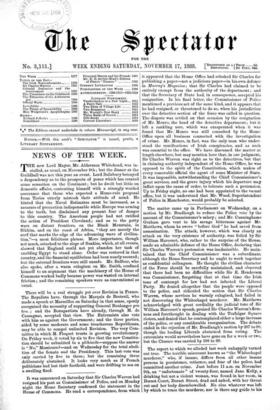It was announced on Saturday that Sir Charles Warren had
resigned his post as Commissioner of Police, and on Monday night the Home Secretary confirmed the statement in the House of Commons. He read a correspondence, from which it appeared that the Home Office had rebuked Sir Charles for publishing a paper—not a judicious paper—in his own defence in Murray's Magazine; that Sir Charles had claimed to be entirely exempt from the authority of the department ; and that the Secretary of State had, in consequence, accepted his resignation. In his final letter, the Commissioner of Police mentioned a previous act of the same kind, and it appears that he had resigned, or threatened to do so, when his jurisdiction over the detective section of the force was called in question. The dispute was settled on that occasion by the resignation of Mr. Monro, the head of the detective department; but it left a rankling sore, which was exasperated when it was found that Mr. Monro was still consulted by the Home Office upon all business connected with the investigation of crime. Mr. Monro, in fact, was the only man who under- stood the ramifications of Irish conspiracies, and as au& was essential to the office. We have discussed the matter at length elsewhere, but may mention here that, in our judgment, Sir Charles Warren was right as to the detectives, but that in claiming authority independent of the Home Office, he was opposed to the spirit of the Constitution, which makes of every removable official the agent of some Minister of State. It was impossible, notwithstanding the Chief Commissioner's great services, and the grave injury which his departure may inflict upon the cause of order, to tolerate such a pretension. Up to Friday night, no one had been appointed to the vacant office, but it was understood that Mr. Wood, Superintendent of Police in Manchester, would probably be selected.


















































